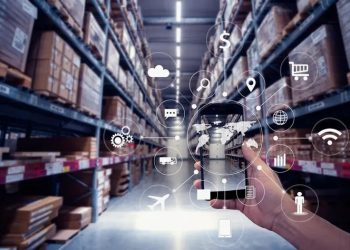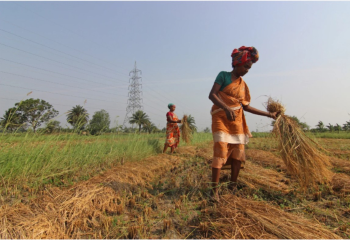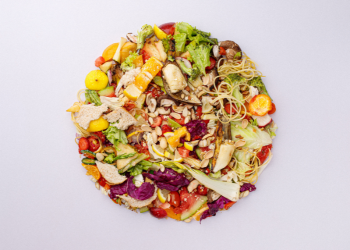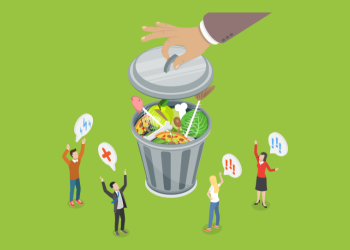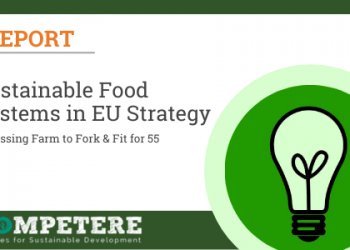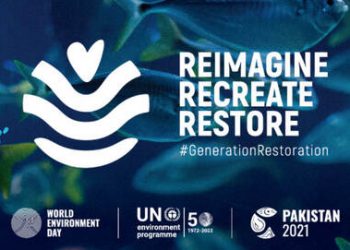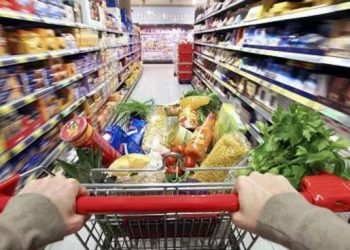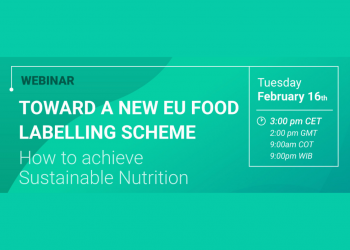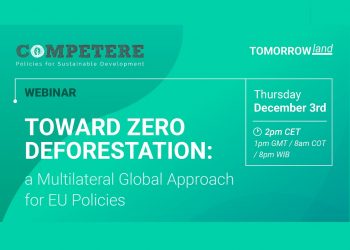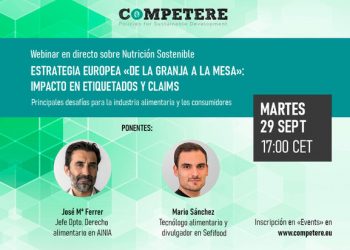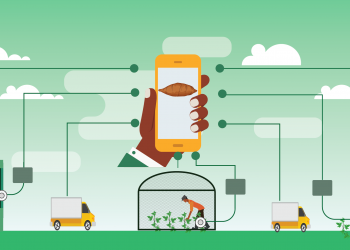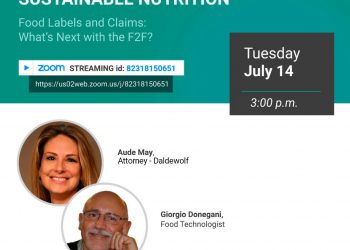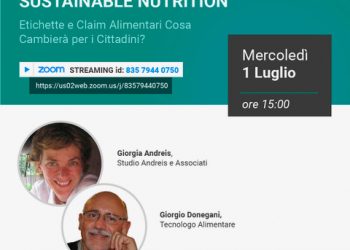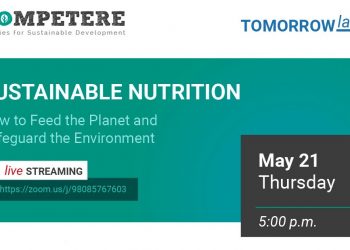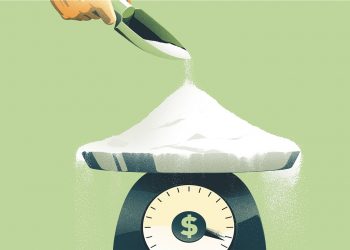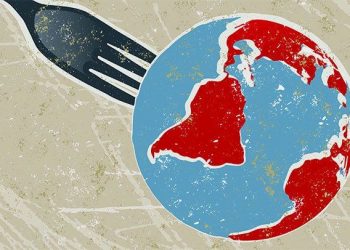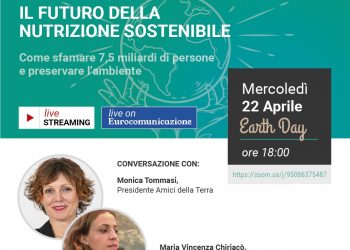
The fast-growing world population (currently 7.6 billion – projected to be 10 billion by 2050) deserves a healthy, safe diet capable of providing the proper and most effective nutrients, as recommended by the FAO.
We are starting to see more and more promising and innovative food technologies emerge, all with very limited impact on the environment and biodiversity. However, their implementation is still largely in the future. Most of the world’s population continues to rely on existing nutrients that require intensive land use and farming of natural resources, including the employment of animal and human labor. Furthermore, while humanity in many parts of the world has been able to prosper and effectively reduce poverty, its impact on the environment has been detrimental, as the pace of climate change demonstrates.
Human beings must work together to discover, develop and implement policies that foster the production of innovative, safe and secure nutrients through sustainable supply chains, in order to meet as many SDGs as possible.
THE SUSTAINABLE NUTRITION PLATFORM
Sustainable Nutrition is a food system that aims to ensure accessible, affordable and culturally relevant foods that are wholesome and nutrient-dense, while preserving biodiversity and supporting individual rights and prosperity.
A group of experts with the mission to promote sustainable food supply chains and to shape policies through evidence-based debate and a multi-stakeholder approach.
Mission
We hammer out policies that favor sustainably grown nutrients. We engage Governments, global supply chain players, non-governmental organizations,consumer groups and civil society to innovate food systems, increment productivity, reduce waste, improve working conditions, and support cohesion and education at the local community level.
Vision
Through developments in science, innovation and technology, humanity can prosper and enjoy better living conditions, producing healthier, more secure, and sustainably grown food for all.
Reliance on Science
We reject any ideological approach that seeks a definitive solution to global challenges. We trust in policies and solutions that are rooted in scientific approaches and in the experimental method.+ | Read More
How we work
In order to achieve these goals, we engage Government and policymakers, food producers and distributors, NGOs, and nutrition and sustainability advocates to improve the quality of food, protect biodiversity and enhance human economic and social conditions.+ | Read More
EVENTS
Being updated!
SUSTAINABLE NUTRITION / News
-
Produttività sostenibile e sicurezza alimentare
16 October 2024 -
La carne vegetale è un’alternativa completa alla carne animale?
14 October 2024 -
Spreco alimentare: dalla carne un esempio virtuoso
1 October 2024 -
La sicurezza alimentare chiama: il G7 Agricoltura risponda
24 September 2024 -
EUDR: Our Call to the European Commission for a Smoother Implementation
18 September 2024 -
EUDR Delay: Italy Seeks Extension
17 September 2024 -
L’Italia e la battaglia contro la peste suina
11 September 2024 -
Peste suina africana, come gestire la minaccia per il mercato italiano
11 September 2024 -
Tutelare la biodiversità senza frenare l’economia
20 August 2024 -
Balancing Act: Orangutan Conservation and Human Development
19 August 2024 -
Obesità: una sfida globale per il G7
21 June 2024 -
Gli enormi costi economici dell’epidemia negletta
18 June 2024 -
La nuova PAC è inutile: servono più investimenti
17 May 2024 -
Sugar tax: inutile per la salute
15 May 2024 -
Dieta e stile di vita
7 May 2024 -
Obesity: the invisible pandemic
17 April 2024 -
Forest Beat: Insights into Global Forest Dynamics
9 April 2024 -
La deforestazione rallenta il passo
26 March 2024 -
The global trend of deforestation is slowing down
22 March 2024 -
Smallholder: la spina dorsale della sicurezza alimentare
19 March 2024 -
The “backbone” of food security in Africa
12 March 2024 -
Nasce l’Alleanza contro l’obesità
12 March 2024 -
Advancing food loss technologies and policies
13 February 2024 -
Regolamentazione delle NGT: un primo passo promettente
25 January 2024 -
Tecnologie predittive e domotica contro gli sprechi alimentari
7 November 2023 -
Unfair demonisation of industrial food
24 October 2023 -
Per il cibo industriale un’ingiusta demonizzazione
17 October 2023 -
Le politiche anti-deforestazione dell’Unione europea
10 October 2023 -
Tackling food waste for a sustainable future
29 September 2023 -
EU anti-deforestation policy. What is Italy doing?
26 September 2023 -
The geopolitics of cocoa
26 September 2023 -
La geopolitica del cacao
25 September 2023 -
Policy UE anti-deforestazione. L’Italia che fa?
19 September 2023 -
Food: geopolitical emergency
12 September 2023 -
Alimentazione: emergenza geopolitica
7 September 2023 -
Il grande banchetto
5 September 2023 -
Anti-deforestation policy: palm oil as a sustainable model
29 August 2023 -
Alimenti sostenibili: too green to be true?
9 August 2023 -
EUDR and chocolate: will the industry be able to adapt?
1 August 2023 -
Sustainable food: too green to be true?
1 August 2023 -
Tackling Traceability
20 June 2023 -
EUDR and the case of sustainable palm oil
9 May 2023 -
Ensuring Food Safety in India
2 May 2023 -
God’s diet
11 April 2023 -
Smallholders as a pivotal player
4 April 2023 -
Food industry: protection of intellectual property
14 March 2023 -
Analysis of the World Resources Report
28 February 2023 -
Road to zero-deforestation: what’s next?
21 February 2023 -
Supply chains welcome the EU regulation against deforestation
13 February 2023 -
Green Deal Industrial Plan: Brussel’s bureaucratic cage
31 January 2023 -
Innovative tips to prevent food waste
31 January 2023 -
Contro la deforestazione, l’importanza del pragmatismo
28 December 2022 -
WWF supports the transition to sustainable palm oil
6 December 2022 -
Etichette alimentari: la strana moda dei “senza”
6 December 2022 -
Companies’ return to palm oil
28 November 2022 -
Sicurezza alimentare: strategie globali e tecnologia
8 November 2022 -
Asvis: sustainable nutrition for the SDGs
18 October 2022 -
The growth of sustainable palm oil
11 October 2022 -
EU palm oil imports: jan-jun 2022 vs 2021
27 September 2022 -
How smallholders boost sustainability
20 September 2022 -
First commodities monitor released
18 July 2022 -
Materie prime agrifood: Competere audito al Senato
14 July 2022 -
Fake news e come (non) fabbricarle
13 June 2022 -
La sostenibilità parte dall’inclusione
5 June 2022 -
Nutriscore: Macron at a crossroads
17 May 2022 -
Palm oil, a reliable friend
13 May 2022 -
Green Deal sostenibile?
10 May 2022 -
Agricoltura italiana, il futuro è 4.0
2 May 2022 -
Are saturated fats harmful?
23 March 2022 -
Sustainable palm oil: a supply chain to invest in
21 March 2022 -
Agri-food commodities: cost trend analysis
21 March 2022 -
Olio di palma sostenibile: una filiera su cui investire
17 March 2022 -
Saturated fats: debunking the myth
15 March 2022 -
War and food commodities crisis
4 March 2022 -
Guerra e crisi materie prime alimentari
4 March 2022 -
The “Ukrainian” effects on raw materials
3 March 2022 -
Gli effetti “ucraini” sulle materie prime
3 March 2022 -
From illicit crops to a prosperous future
22 February 2022 -
Cibo: ogni grammo sprecato è un grammo di troppo
8 February 2022 -
Food: every gram wasted is one too many
8 February 2022 -
Contro lo spreco alimentare
5 February 2022 -
Food waste and hunger
1 February 2022 -
Spreco alimentare e fame
1 February 2022 -
Three billions to agriculture
25 January 2022 -
Tre miliardi per l’agricoltura
25 January 2022 -
If we want to save the planet, don’t look up
11 January 2022 -
Se vogliamo salvare il pianeta, don’t look up
11 January 2022 -
Small-Holders: Drivers of prosperity and sustainability
15 December 2021 -
Nuclear energy can free Europe from the chess game
30 November 2021 -
È l’ora del nucleare, per un’Europa non più sotto scacco
30 November 2021 -
PRESS RELEASE – The European scientific community against Nutriscore
16 November 2021 -
Science vs Ideology: Beyond Nutriscore
16 November 2021 -
#NoNutriscoreBecause – Competere launches new campaign
2 November 2021 -
[ITA] Etichettatura alimentare: Intervista a Andrea Poli
5 October 2021 -
Switzerland Says Yes to Sustainable Palm Oil
4 October 2021 -
Sì all’Olio di Palma Sostenibile: L’Esempio della Svizzera
30 September 2021 -
Dal Nutriscore all’Italian Sounding: le Battaglie del Made in Italy
21 September 2021 -
Sustainable Food Systems in the EU Strategy – REPORT
8 September 2021 -
Lettera aperta: il Governo intervenga contro Oms e Iarc
7 September 2021 -
[ITA] Etichette Fronte-Pacco: la parola ai consumatori
17 August 2021 -
[ENG] Front-of-Package Labels: the Floor to Consumers
17 August 2021 -
[ENG] Nutriscore’s Algorithm: Health According to Whom?
10 August 2021 -
[ITA] L’Algoritmo del Nutriscore: la salute secondo chi?
10 August 2021 -
Guatemala Invests in Sustainability
14 July 2021 -
Guatemala, la Via della Sostenibilità
3 July 2021 -
An Inconvenient Truth: Deforestation Facts and Myths
22 April 2021 -
Stop industrial fishing of maldivian sharks
12 April 2021 -
Olio d’oliva in Serie C? Nutriscore vs. Nutrinform
Mentre il dibattito è paralizzato dalle politiche vaccinali e gli interventi di Recovery Fund, proseguono i lavori della Commissione UE su una prima strategia europea agroalimentare integrata: la Farm to Fork e un sistema di etichettatura armonizzato per i prodotti alimentari. Quali sono le possibili conseguenze per il settore agri-food? È possibile un sistema alternativo al Nutri-score?
22 March 2021 -
SWITZERLAND: A MODEL FOR EUROPE
Switzerland has introduced sustainability certification for palm oil from Indonesia This certification should be applied to all vegetable oils, including those produced domestically This benchmark should also be adopted by the EU THE FACTS On 7th March, Swiss citizens confirmed in a referendum the first trade agreement with Indonesia based on sustainability criteria. This
10 March 2021 -
SVIZZERA: UN MODELLO PER L’EUROPA
La Svizzera ha introdotto la certificazione di sostenibilità per l’olio di palma proveniente dall’Indonesia La certificazione dovrebbe essere applicata a tutti gli oli vegetali, anche quelli prodotti internamente Questo benchmark dovrebbe essere adottato anche dalla UE. COSA SUCCEDE Il 7 Marzo i cittadini svizzeri hanno confermato con il voto referendario il primo accordo
10 March 2021 -
Olio di palma, disinformazione e giornalisti.
10 February 2021 -
La Guerra agli Zuccheri, ai Grassi e al Sale – LIVE TALK
3 February 2021 -
Palm oil, development and Nigeria
29 January 2021 -
Olio di palma sintetico: una soluzione più sostenibile?
20 January 2021 -
Sustainable Nutrition: Competere participates in POTS2021
13 January 2021 -
Nutrizione Sostenibile: Competere partecipa al POTS2021
13 January 2021 -
Contro la deforestazione l’UE non può agire da sola
29 October 2020 -
Farm to Fork: Utopia Ideologica vs. Scienza
22 September 2020 -
Nasce l’Osservatorio Sustainable Nutrition
27 May 2020 -
Dieta Sostenibile: cosa ci dice la Eat-Lancet
Dieta sostenibile Il cibo in un mondo sempre più consumatore ed attento alla salute ottiene una nuova funzione: quello di migliorare il benessere dell’uomo e la sostenibilità ambientale. Per questo motivo la Commissione Eat-Lancet ha elaborato il “Food in the Anthropocene: the Eat-Lancet Commission on healthy diets from sustainable food systems”, uno studio interdisciplinare che si
23 March 2020 -
Sovranismo Alimentare – L’Aria che Tira – La7
7 August 2019 -
L’ingannevole “senza” delle etichette alimentari
27 February 2018 -
Etichette: il “Senza” a Rischio Imborglio per i Consumatori
12 January 2018 -
Defending Palm Oil Against Unfair Attacks
24 November 2017 -
Grano, le Domande di Competere a Report
31 October 2017 -
Contro il Protezionismo, la Nuova Battaglia del Grano
25 October 2017 -
Protezionismo, la Nuova Battaglia del Grano
25 October 2017 -
Agricoltura 4.0, Per Sostenere l’Eccellenza Italiana
24 October 2017 -
Spreco Alimentare, Perché Non Conviene
17 October 2017 -
Il Protezionismo Danneggia il Grano e il Made in Italy
5 October 2017 -
Disastri Ambientali: la Tecnologia Può Bastare?
5 September 2017 -
In Difesa dell’Olio di Palma
27 May 2017 -
I Dati sulla Carne Rossa di cui l’OMS Non Parlerà Mai
1 November 2016 -
Smart Agriculture: Ora Facciamo sul Serio
20 September 2016





























